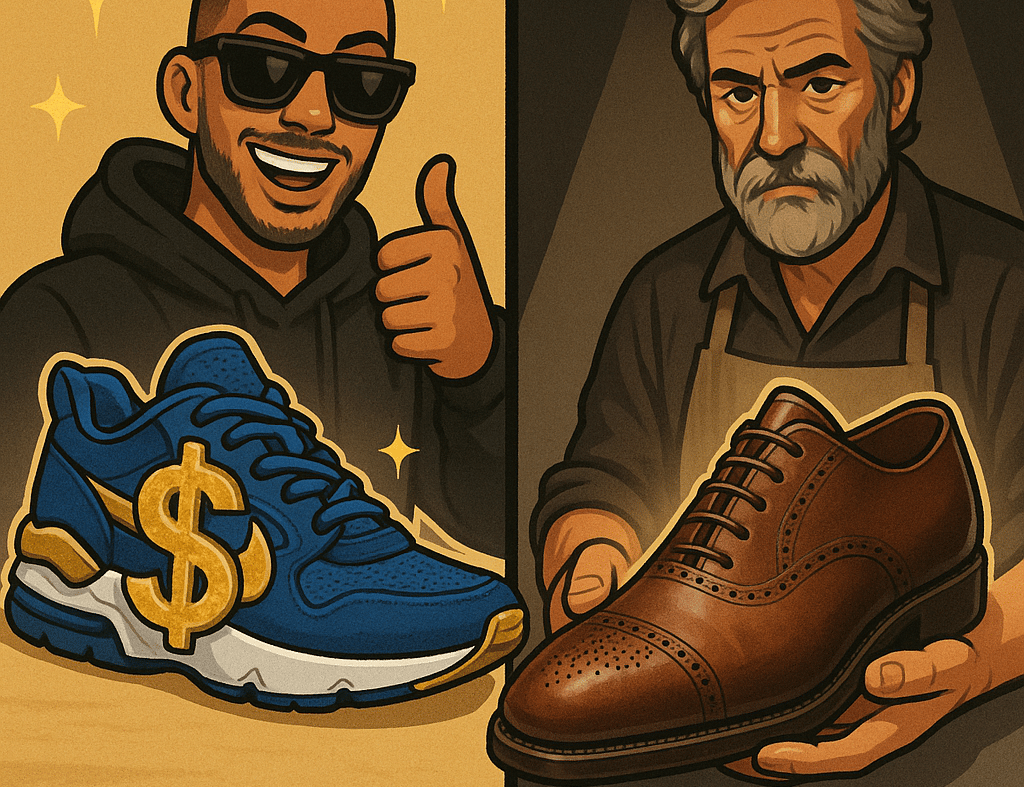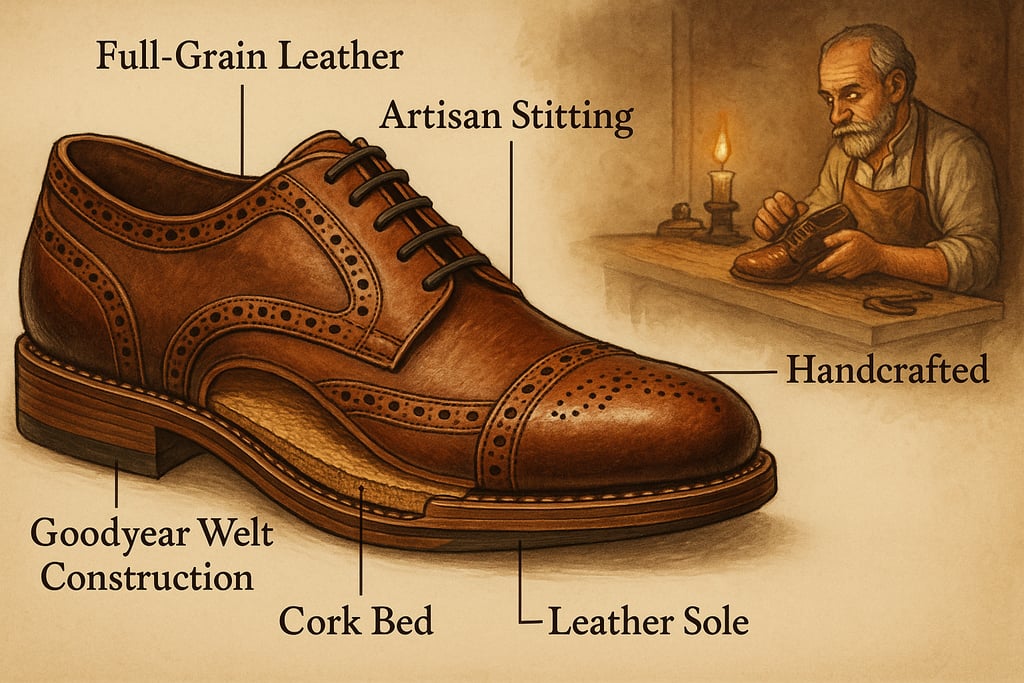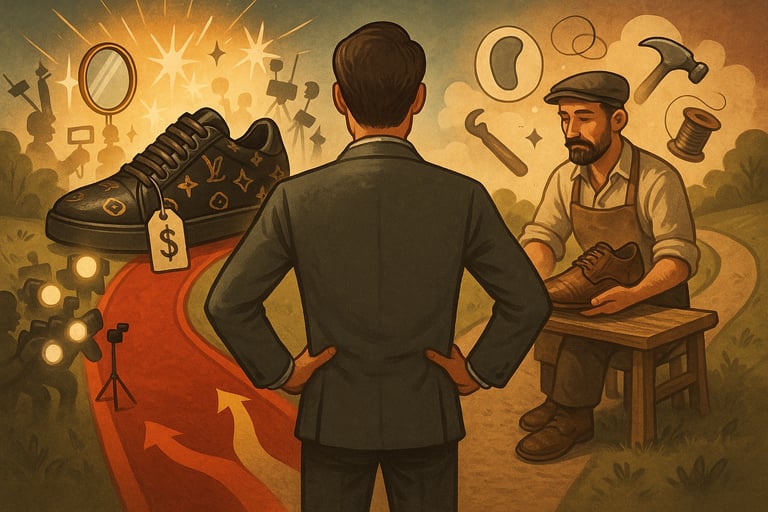Are Expensive Men’s Shoes Really Worth It? 11 Surprising Reasons You Might Regret Not Buying Them
Expensive Men’s Shoes Really Worth It? It’s a question that sparks debate in boardrooms, style forums, and shopping malls alike. With some men’s shoes costing as much as a month’s rent, it’s only natural to wonder: is the price tag justified—or just a flashy logo with inflated costs? In this in-depth guide, we’ll explore every angle of expensive men’s footwear—materials, comfort, craftsmanship, resale value, and more—to help you decide whether those high-end Oxfords or Italian loafers deserve a place in your wardrobe.
7/10/2025


Are Expensive Men’s Shoes Really Worth It? 11 Surprising Reasons You Might Regret Not Buying Them
Are Expensive Men’s Shoes Really Worth It? It’s a question that sparks debate in boardrooms, style forums, and shopping malls alike. With some men’s shoes costing as much as a month’s rent, it’s only natural to wonder: is the price tag justified—or just a flashy logo with inflated costs?
In this in-depth guide, we’ll explore every angle of expensive men’s footwear—materials, comfort, craftsmanship, resale value, and more—to help you decide whether those high-end Oxfords or Italian loafers deserve a place in your wardrobe.
Understanding the Price Tag
What Makes Shoes Expensive?
High-end men’s shoes often come with a premium cost due to the type and quality of materials used. Think full-grain leather, Goodyear welt construction, and hand-finishing. These shoes take time—sometimes days or weeks—to make. That level of detail doesn’t come cheap.
Materials vs. Marketing Costs
Luxury brands invest heavily in marketing, image-building, and storefront design. Sometimes, a significant portion of the cost goes not into the shoe itself but into creating its aura of exclusivity. However, not all expensive shoes are just brand fluff—some justify every dollar with robust materials and thoughtful design.
Craftsmanship and Construction
Handmade vs. Machine-Made
Handmade shoes are crafted with precision and care, ensuring a better fit and finish. Machine-made shoes, while faster to produce, often cut corners. When shoes are handcrafted by experienced artisans, the durability and aesthetic are often superior.
The Role of Skilled Artisans
True luxury footwear brands employ master shoemakers who’ve honed their skills for decades. These professionals inspect each stitch and sole, making subtle adjustments that machines can't replicate. That level of craftsmanship results in a truly bespoke feel.
Comfort and Fit Comparison
Arch Support and Cushioning
Expensive shoes usually feature anatomical designs with proper arch support and high-quality insoles. Cheaper alternatives may skimp on cushioning, leading to foot fatigue after a few hours of wear.
Custom Fit and Lasting Comfort
Brands like Edward Green or John Lobb provide different “lasts” (shoe shapes) to match various foot types. This means a more personalized fit, reducing discomfort and the likelihood of long-term foot issues.
Durability and Longevity
Stitching, Soles, and Structural Integrity
Premium men’s shoes often use Goodyear welt or Blake stitching, making them more durable and water-resistant. Soles are typically leather or high-quality rubber, built to handle years of wear.
Repairability and Resoling
One major benefit of investing in expensive shoes is the ability to resole them. A well-made pair can be resoled 3-5 times over its lifespan, extending its usability far beyond cheap alternatives.
Style and Status Symbol
Fashion Credibility and Brand Value
Let’s be real—luxury shoes send a message. Whether it’s confidence in the workplace or social standing at an event, expensive shoes often elevate your entire look and influence how others perceive you.
The Psychological Impact of Wearing Expensive Shoes
Wearing quality footwear can improve your posture, gait, and overall confidence. When you feel good from the ground up, it shows. That psychological uplift might just be worth the price.
Cost Per Wear Analysis
Calculating Value Over Time
A $500 pair of shoes worn 100 times costs $5 per wear. Compare that to a $100 pair that breaks down after 10 wears—that’s $10 per wear. Often, expensive shoes become more economical over time.
Case Study: $500 Shoes vs. $100 Shoes
Consider Allen Edmonds vs. a generic department store brand. The former can last a decade with care; the latter might barely make it past one season. The math speaks for itself.
Environmental and Ethical Factors
Sustainable Production Practices
High-end brands increasingly use eco-friendly leather and vegetable dyes, reducing the environmental footprint. Mass-market shoes, in contrast, often involve heavy chemical processing.
Labor Conditions and Transparency
Luxury shoemakers in Italy, the UK, and the US usually follow stringent labor laws and ethical sourcing practices. On the other hand, fast-fashion shoes may come from sweatshops with poor working conditions.
Resale and Investment Potential
Do Designer Shoes Hold Value?
Surprisingly, yes. Brands like Alden or Crockett & Jones retain their resale value, especially if lightly worn and well-maintained. Some limited editions even appreciate over time.
Collectibles and Limited Editions
Men’s shoe collectors are a niche but passionate group. Rare models or discontinued runs often become highly sought-after, turning footwear into investment pieces.
When Expensive Shoes Are NOT Worth It
Common Pitfalls and Red Flags
If the high price is due to hype, celebrity endorsements, or superficial features (like logos), it may not be worth it. Always investigate whether the shoe’s build justifies its cost.
Overpaying for the Brand Name Alone
Not all luxury shoes are created equal. Some are mass-produced and rely on brand prestige rather than construction quality. Always research before buying.
Affordable Alternatives That Deliver
Budget Brands with Premium Quality
Brands like Meermin, Thursday Boot Co., and Beckett Simonon offer excellent craftsmanship at mid-tier prices—often around $150–$250. They're a smart compromise.
Smart Shopping Strategies
Watch for seasonal sales, secondhand luxury sites, or factory outlets. You might score a $500 pair for $200 if you know where to look.
Expert Opinions and Shoe Reviews
What Stylists and Shoemakers Say
Many stylists argue that shoes are a foundational element of a man’s wardrobe. Investing in a solid pair can change your whole ensemble. Shoemakers echo that fit and quality matter more than the brand name alone.
Consumer Reports and Forums
Sites like StyleForum and Reddit’s r/goodyearwelt offer real-user feedback. There’s a wealth of shared wisdom on what shoes offer the best value for money.
How to Choose the Right Shoe for You
Lifestyle and Use Case Analysis
If you're in corporate environments daily, a quality dress shoe pays dividends. If you work remotely, one or two versatile pairs might be all you need.
Foot Type and Personal Fit
High arches? Wide feet? Don’t just go by brand—go by fit. Some brands excel at fitting specific foot types, and this makes all the difference in long-term comfort.
Maintaining Shoe Quality Over Time
Cleaning, Polishing, and Storage Tips
Regular polishing, moisturizing the leather, and using a shoehorn can extend the life of your shoes dramatically.
Shoe Trees and Protective Accessories
Using cedar shoe trees maintains shape and absorbs moisture. Invest in a good brush and polish kit. It’s a small price for preserving your investment.
The Emotional and Psychological Value
Confidence Boost and Self-Image
Wearing sharp shoes can significantly uplift your self-esteem. That extra bounce in your step? It’s real—and often priceless.
Professional Impressions and Social Perception
First impressions count. A pair of polished brogues can leave a lasting impact, especially in professional or formal settings.
Frequently Asked Questions (FAQs)
1. Are expensive men’s shoes more comfortable?
Yes, generally due to better arch support, materials, and personalized fit.
2. Can expensive shoes really last a decade?
Absolutely—with care, resoling, and storage, many high-end shoes last 10+ years.
3. Is it okay to buy expensive shoes secondhand?
Yes, especially from trusted sellers. Just ensure soles and linings are in good condition.
4. What brands offer good value for the price?
Allen Edmonds, Meermin, and Loake are great starting points for quality-to-cost balance.
5. Are handmade shoes better than machine-made?
Usually, yes. Handmade shoes offer precision, durability, and better fit.
6. Do expensive shoes improve posture or health?
High-quality shoes with proper arch support can help posture and reduce foot fatigue.
Conclusion: Final Verdict
Are Expensive Men’s Shoes Really Worth It? Let’s Decide
So, are expensive men’s shoes really worth it? If you're looking for long-term value, superior comfort, durability, and a confidence boost—they absolutely can be. While not every expensive shoe is worth its tag, educated buyers who understand construction and fit will often find the investment worthwhile.



